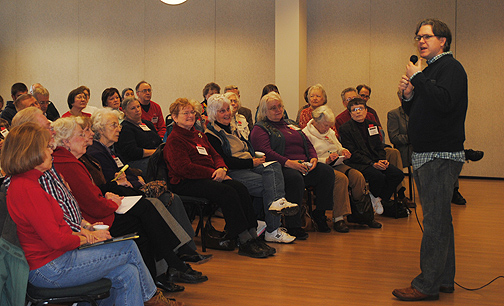Roles within the church in an open source structure were discussed Tuesday during the second session of the Theologian-in-Residence lecture series at Tusculum College.
The Rev. Landon Whitsitt, author of “Open Source Church: Making Room for the Wisdom of All,” is leading the annual Theologian-in-Residence series, co-sponsored by the Holston Presbytery and Tusculum College with funding from Ron Smith.
An open source structure is organized differently than the top-down command structure that has been predominant in main-line Christian churches, said Rev. Whitsitt, who serves as the stated clerk of the Synod of Mid-America in the Presbyterian Church (U.S.A.).
That church structure works for many people and they don’t want to explore another structure, which is okay, he said, but the open source structure offers another way for people to gather together and faithfully point others to Jesus.

The Rev. Landon Whitsitt speaks about Wikipedia and its how its community organization can be related to the Christian community’s structure during the second session of the Theologian-in-Residence lecture series.
The open source world view, which was introduced during the first session, explores the perspective of those who have grown up in the age of personal computing and the Internet and how that affects how they think about their Christian faith.
In writing his book about this world view, Rev. Whitsitt was inspired by open source software and its developers’ ideas about freedom. Similarly, he said, he looked to see if there was a community in the world that professes to operate in a way that lives out ideas of freedom in fellowship and if so, if that community could offer something to Christians considering how they come together as a church.
The community he found was Wikipedia, not only the online encyclopedia with which most are familiar, but also the community of individuals working together to create, edit and maintain that encyclopedia. There is not a one-on-one correlation between Wikipedia and the church, Whitsitt said, but its structure and community roles provide something to consider in how the church can be organized with the freedom that is part of the open source church.
Wikipedia has five pillars that describe what it is and how it operates. The first pillar says that Wikipedia is an online encyclopedia seeking to provide equal access to information and also points out what it is not, such as a soapbox, an experiment in anarchy or a dictionary.
Likewise, a church needs to be very clear about what it is that God has called it together to do, Whitsitt said. “What is it that is unique about the church, what does the church have to offer that the Rotary does not?”
The second pillar is that Wikipedia has a neutral point of view and strives for verifiable accuracy. In the Christian faith, “Jesus Christ is Lord is only the gravity we have,” he said. “Everything else is up for verification.”
The third pillar of Wikipedia is that its content is free and open to merciless editing. An editor cannot own content. In the church, Whitsitt said, this can be related to the issue of control and whether a congregation is open to change. “Are we willing to allow ourselves to be reformed by God?”
The fourth pillar is that members of the Wikipedia community should behave in a respectful and civil manner even when they disagree. In the life of the church, theology is very important, but relationships are just as important, he said, and people should be able to disagree civilly without breaking those relationships.
The fifth pillar is that Wikipedia does not have firm rules other than what are stated in the pillars and encourages its participants to act boldly and not be afraid to make mistakes. Similarly, Whitsitt said, there are no firm rules on how to do church, and nothing is irreparable if something is tried and does not work.
Whitsitt then discussed the roles of people within the Wikipedia community and how those roles can apply to the church.
Within the Wikipedia community, the largest group is the anonymous editors, defined as those who engage the online encyclopedia in some way, including individuals reading articles or making edits anonymously to the articles. Registered editors of Wikipedia have a few more abilities, such as the authority to start an article.
In comparison, Whitsitt said, the differences between those in the church who are members and those who just attend are that the members can vote and serve in an office. Both attendees and members enjoy the benefits of the church, such as the worship services, fellowship, pastoral care and Christian education.
Everyone in a church has something to offer, he said. “The open source generation wants to live out their calling,” Whitsitt continued. “They are going to do it with or without us.”
Administrators in the Wikipedia community are registered editors who have been selected by the community to take on further responsibilities such as making sure article edits are accurate and the encyclopedia remains operational. There is also a “benevolent dictator;” one person who has the power to act and do what is in the best interest of the entire community.
In comparison, the church has elders, deacons and a pastor. With a comparable structure in a church, the top-down command structure is turned upside down, because the members are the most important people in the community. Administrators’ roles are of servant leaders to make sure those in the church have the resources, whether physically, spiritually or intellectually to do what God wants them to do.
The series will continue on Feb. 21 and will conclude Feb. 28. The sessions begin at 10 a.m. in the Chalmers Conference Center in the Niswonger Commons on the Tusculum College campus. There is no charge to attend the lecture series, but reservations are required as lunch is provided in the college’s cafeteria. To register or for more information, please call 423.636.7304 or email eestes@tusculum.edu.


